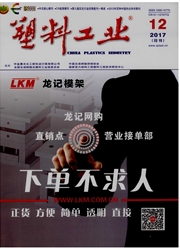

 中文摘要:
中文摘要:
采用原子转移自由基聚合(ATRP)方法合成的聚苯乙烯-b-聚丙烯酸丁酯-b-聚γ-甲基丙烯酰氧丙基三甲氧基硅烷(PS-b-PnBA-b-PMPS)嵌段共聚物偶联剂处理玻璃纤维,研究了共聚物偶联剂对玻璃纤维增强不饱和聚酯力学性能的影响。结果表明:嵌段共聚物偶联剂能有效改善复合材料的强度、模量及韧性,适当增大共聚物中聚苯乙烯嵌段的链长,有利于复合材料的弯曲强度和弯曲模量的提高;复合材料的冲击强度则随着PnBA嵌段链长的增长而提高,但过长的PnBA链长会导致弯曲强度及模量的下降,当PnBA聚合度为50时,可获得强度、模量及韧性均较高的复合材料。
 英文摘要:
英文摘要:
Polystyrene-b-poly ( butyl acrylate) -b-Poly ( r-methacryloxy propyl trimethoxysilane) ( PS-b- PnBA-b-PMPS) as a tri-block copolymer coupling agent was synthesized by atom transfer radical polymeriza- tion (ATRP) and used to treat the surface of glass fiber, studied its effect on the static mechanical properties of glass fiber/unsaturated polyester resin composites. The results showed, block copolymer coupling agent could improve strength, modulus and toughness effectively, and increase in the block lengths of polystyrene was of advantage to bending strength and modulus of composites. But too long PnBA chain length would lead the decline of bending strength and modulus, when PnBA polymerization degree was 50, the higher strength, modulus and toughness of the composites were available.
 同期刊论文项目
同期刊论文项目
 同项目期刊论文
同项目期刊论文
 期刊信息
期刊信息
